|
|
|
Sort Order |
|
|
|
Items / Page
|
|
|
|
|
|
|
| Srl | Item |
| 1 |
ID:
100070
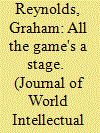

|
|
|
|
|
| Publication |
2010.
|
| Summary/Abstract |
The primary purpose of this article is to examine the extent to which Canada's copyright laws permit the creation of machinima, an art form broadly defined as the creation of films within video games. This article is structured as follows. First, it will introduce machinima, discussing its origins, its development and its social importance. Second, it will examine whether the acts of creating and distributing machinima infringe copyright in Canada. Third, it will ask whether there are any defences to copyright infringement on which machinimators (those who create machinima) can rely. This article will demonstrate that, in many cases, the creation and distribution of machinima likely infringes Canadian copyright law. Furthermore, a large percentage of machinima that are found to infringe copyright will not be protected by the fair dealing defence as it is currently being applied by Canadian courts. This article will conclude by situating the narrow issue of machinima and copyright infringement within the broader context of creativity and copyright reform in the digital age.
|
|
|
|
|
|
|
|
|
|
|
|
|
|
|
|
| 2 |
ID:
140720


|
|
|
|
|
| Summary/Abstract |
Economists have warned for many years that preferential trade agreements (PTAs) will not necessarily increase economic welfare in Australia given the relatively small size of the economy and the country’s lack of negotiating coin. The Productivity Commission cautioned in its major report on PTAs that there seemed to be a mindset of ‘agreements for agreement’s sake’, in part because of fears of missing out on a bandwagon that has attracted Australia’s major trading partners. Political and security considerations have played an important role in shaping Australia’s approach to PTAs. When politics trumps economics in negotiations of PTAs there is a risk of a rush to premature agreement that produces sub-optimal outcomes, that undermines broader plurilateral and global negotiations, and that introduces new and undesirable distortions in trade and public policies. Various theoretical approaches to trade policymaking provide insights into why Australian governments have been willing to conclude these sub-optimal deals.
|
|
|
|
|
|
|
|
|
|
|
|
|
|
|
|
| 3 |
ID:
021936
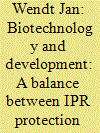

|
|
|
|
|
| Publication |
May 2002.
|
| Description |
233-240
|
|
|
|
|
|
|
|
|
|
|
|
|
|
|
|
| 4 |
ID:
105135
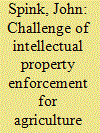

|
|
|
|
|
| Publication |
2011.
|
| Summary/Abstract |
One often-overlooked aspect of intellectual property rights (IPR) strategy is the deterrence and enforcement against 'irresponsible defendants' including product counterfeiters. When applied to food, the consumer product fraud or product counterfeiting is referred to as food fraud, or economically motivated adulteration. While this problem is not unique to agriculture and food products, there are special circumstances and issues to consider. The objectives of this paper are to: (1) review the underlying fraud opportunities (complex and on a massive scale), including an exploration of types of fraudsters and types of fraud (near infinite); (2) review how globalization and source economies contribute to the problem; (3) review the complexity and challenges of enforcement for companies and agencies; and (4) introduce the 'chemistry of the crime' or the 'crime triangle', to shift the focus from reactionary intervention and response to proactive prevention. Five applicable case studies are included, bringing insights on the irresponsible nature of many of the fraudsters. Through its review of fraudsters and types of fraud, this study will provide information to assist with IP technology transfers and the effective enforcement of IPR. Product counterfeiting often poses a very serious public health and economic threat to agriculture and food products. There are very motivated, intelligent, resilient and aggressive fraudsters, but they can be deterred by companies or agencies focused on reducing fraud opportunities. Standard business practices-even identified best practices-often inadvertently contribute to fraud opportunities.
|
|
|
|
|
|
|
|
|
|
|
|
|
|
|
|
| 5 |
|
| 6 |
ID:
086957
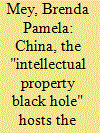

|
|
|
|
|
| Publication |
2009.
|
| Summary/Abstract |
After a hard-fought battle that saw China clinch the bid to host the XXIX Olympic Games, the country put comparable efforts into upgrading its intellectual property laws, not only to bring them into consonance with the provisions of the Agreement on Trade-Related Aspects of Intellectual Property Rights (TRIPS), but also to accord the Olympic-related intellectual property rights the appropriate protection. Despite these efforts, China is still plagued with a myriad of TRIPS compliance problems. The Olympic Games presented the opportunity that China needed to light the torch that would help it repair the damage caused to its image by issues such as reverse engineering of almost everything under the sun, as well as those relating to enforcement and protection of intellectual property rights (IPRs), etc., and cause it to be seen in a positive light by the rest of the world. The world watched China closely for the weeks of the Olympic Games and will be watching it, even after the Olympic torch has flickered out, to see whether the enforcement and protection of IPRs will outlast the Olympic ceremony.
|
|
|
|
|
|
|
|
|
|
|
|
|
|
|
|
| 7 |
ID:
076679
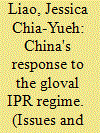

|
|
|
| 8 |
ID:
110294


|
|
|
|
|
| Publication |
2011.
|
| Summary/Abstract |
This paper deals with the issue of a cinematographic lyricist's right to copyright royalty after the producer of a film has been assigned the right. The position of law in India is not in favour of writers, who are often marginalized and cut-out from a share in the profits by generally exploitative and unfavourable terms of a contract. In the light of the same, the author's view is that an amendment to the Copyright Act was long overdue and the Copyright (Amendment) Bill, 2010 is an affirmative step by the government to correct inequitable balance of interests that has plagued the Indian film industry. In order to arrive at a deeper understanding of the matter, reliance needs to be placed on the stand taken by the Indian judiciary with respect to the right of authors over lyrics used in songs in cinematographic vehicles. Recourse will also be taken to considerations on the basis of which the Bill is being pushed. An analysis of the lacunae that may exist even if the reforms are brought to fruition is concluded with certain suggestions to overcome them.
|
|
|
|
|
|
|
|
|
|
|
|
|
|
|
|
| 9 |
ID:
101376


|
|
|
|
|
| Publication |
2010.
|
| Summary/Abstract |
While the WTO secretariat, key delegations, several NGOs, and industry publicly present the 30 August 2003 WTO Decision as an attempt to reconcile intellectual property with access to medicines, our research shows otherwise. We draw on qualitative analyses of 54 interviews and a lexicometric analysis of press releases to show that their enthusiastic public statements contrast deeply with their internal, cynical beliefs. Most of these actors not only consider the WTO Decision to be fundamentally flawed but claim to have known this prior to its adoption. We argue that a procedural norm of consensus-seeking impeded traditional bargaining over this sensitive issue and that distrust among participants hindered truth-seeking deliberation. Caught between strategic and communicative actions, state and non-state actors found themselves trapped in their own rhetoric of reconciling intellectual property with access to medicines. They realized that the appearance of a solution, rather than a functional solution, provided the only realistic outcome to a fruitless and publicly damaging continuation of debate. From a theoretical perspective, this case study sheds a new light on the gray zone between rational choice theory and constructivism, where both discourse and strategies matter. From an empirical perspective, it illustrates the risk of seeking consensus within international regimes when the procedural norm of consensus coexists with a high level of distrust.
|
|
|
|
|
|
|
|
|
|
|
|
|
|
|
|
| 10 |
ID:
193198
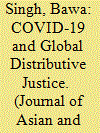

|
|
|
|
|
| Summary/Abstract |
The second wave of the COVID-19 pandemic had left heart-wrenching impacts on all facets of life in general and the availability, accessibility, and affordability of medicines and vaccines in particular. Rather, the world has been divided into two groups regarding access to medicine and vaccines as haves and have-nots. The rich countries had pre-ordered the vaccines of COVID-19 along with the holding of the same. The pandemic situation was further worsened, given the Trade-Related Intellectual Property Rights (TRIPS) in practice and restrictions on sharing technology of vaccines, medicines, and life-saving equipment. In this context, India and South Africa have proposed the joint proposal and garnered support for waiving off TRIPS to ensure equity, accessibility, and affordability of vaccines and the same as public goods. In this review, we emphasize that global justice is one of the important elements of normative international theories, which focus on all the moral obligations from the world’s rich to the world’s poor. The paper also questions and argues that if the rich countries fail to go by the principles of global justice, can the Indian and South African (SA) patent diplomacy play a catalyst role in global justice? The review concludes with an emphasis on global solidarity, and the acceptance of joint India–South Africa’s “patent diplomacy” for TRIPS waiver would result in mass production and fair distribution, making the COVID-19 medicines and technologies available to everyone regardless of their poor–rich status.
|
|
|
|
|
|
|
|
|
|
|
|
|
|
|
|
| 11 |
ID:
151485
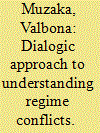

|
|
|
|
|
| Summary/Abstract |
Despite the fact that early work on international regimes conceptualised them as dialogic in nature, this fundamental regime property has remained relatively underdeveloped. Drawing on the work of Mikhail Bakhtin and his circle, this article proposes a dialogic framework for understanding regimes and the political struggles that constitute them. Focusing on the contextual and relational properties of signification processes within a regime, one of the key arguments is that neither their dialogic nature nor the trajectory and outcome of a particular conflict can be understood without giving full attention to language as a power-laden form of action. By focusing on how language and discourse are implicated and put to work in a particular instance of regime contestation, namely the Development Agenda proposed by a group of developing countries’ representatives at the World Intellectual Property Organization in 2004, efforts are made not only to bring to the fore the political and ideological nature of the ‘shared understandings’ without which a regime would not exist, but also the manner in which they are reproduced and reinvigorated, even by acts that set out to challenge them.
|
|
|
|
|
|
|
|
|
|
|
|
|
|
|
|
| 12 |
ID:
086956


|
|
|
|
|
| Publication |
2009.
|
| Summary/Abstract |
The application of intellectual property rights (IP) in developing countries is and remains highly controversial, particularly as regards applications to food/agriculture, and pharmaceuticals, which have direct ramifications for large numbers of peoples. One dimension complicating a reasoned dialogue on the public benefits of IP, particularly when many developing countries are implementing the Agreement on Trade-Related Aspects of Intellectual Property Rights (TRIPS) as mandated by membership in the World Trade Organization, is a dearth of information on their actual operation and effects. In this study, we address one particular aspect of the limited documentation on the effects of IP systems, the effect of plant variety protection (PVP) on the genetic productivity potential of varieties. Specifically, we examine wheat varieties in Washington State, United States, which are produced by both public and private sector breeders. Results from the study show that implementation of PVP attracted private investment in open pollinated crops such as wheat in the United States and provided greater numbers of varieties of these crops, which are high yielding from both the public and private sectors. These results may provide some insights for policy makers from developing countries on the effects of IP for plants as their TRIPS commitments are being implemented.
|
|
|
|
|
|
|
|
|
|
|
|
|
|
|
|
| 13 |
ID:
183860


|
|
|
|
|
| Summary/Abstract |
India and South Africa approached the World Trade Organisation to negotiate the temporary waiver of Intellectual Property (IP) rights on Covid-19 vaccines to remove the artificial barrier of patents and boost vaccine production. This commentary advocates for the waiver of IP rights on Covid-19 vaccines. First, the article makes a case for the debate on the validity of the Covid-19 vaccine to qualify for a patent. Market failure and underinvestment in research and development arguments do not hold for granting a patent to Covid vaccines. Next, the article briefly reviews the evidence on the association between vaccination and virus mutations. Evidence suggests that waiving patents is vital to increase vaccination worldwide and curb mutation and reduce the risk of more infectious new variants. Finally, the article argues that the rationale for a patent is economical, based on incentivising innovation and therefore, the losses suffered by various sectors of the economy due to new variant induced fatalities and lockdowns need to be considered for a case for its waiver.
|
|
|
|
|
|
|
|
|
|
|
|
|
|
|
|
| 14 |
ID:
120799
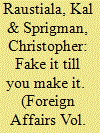

|
|
|
|
|
| Publication |
2013.
|
| Summary/Abstract |
Given that Chinese counterfeiting has benefits as well as costs, and considering China's historical resistance to Western pressure, trying to push China to change its approach to intellectual property law is not worth the political and diplomatic capital the United States is spending on it.
|
|
|
|
|
|
|
|
|
|
|
|
|
|
|
|
| 15 |
ID:
158669


|
|
|
|
|
| Summary/Abstract |
In international relations, globalization transfers the location of governance from nation-states laterally to such private actors as nongovernmental organizations (NGOs) and multinational firms, as well as vertically to local governments and supranational organizations. The purpose of this article is to clarify how the competitions among firms affect the problem of global issues by examining the case of the Trade-Related Aspects of Intellectual Property Rights (TRIPS) and public health. This study shows why most of least developed countries implemented the TRIPS despite the warning of NGOs not to implement earlier for the sake of access to medicines. In order to understand the positive attitude of least developed countries toward the TRIPS, we have to examine how the distribution of pharmaceutical firms capacities in developing countries affect the implementation of the TRIPS Agreement. The existence and different capacities of generic pharmaceutical companies in developing companies are important elements of state policy toward the TRIPS.
|
|
|
|
|
|
|
|
|
|
|
|
|
|
|
|
| 16 |
ID:
118124
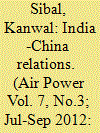

|
|
|
| 17 |
ID:
021937


|
|
|
|
|
| Publication |
May 2002.
|
| Description |
222-232
|
|
|
|
|
|
|
|
|
|
|
|
|
|
|
|
| 18 |
ID:
121774


|
|
|
|
|
| Publication |
2013.
|
| Summary/Abstract |
This paper analyses the impact of intellectual property laws on food security in Least Developed Countries (LDCs), taking the Pacific Islands countries as an example. It argues that ip laws are increasingly impacting upon food security, but are not being adequately taken into account in national policy development. Consequently, national ip regimes are developing in ways that undermine, rather than promote, food security. The paper argues that the particular context of LDCs, including a lack of technological development and reliance upon traditional agricultural systems, requires an approach to intellectual property that is substantially different from the 'one size fits all' approach mandated by the Agreement on Trade-Related Aspects of Intellectual Property Rights.
|
|
|
|
|
|
|
|
|
|
|
|
|
|
|
|
| 19 |
ID:
098828
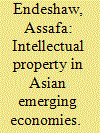

|
|
|
|
|
| Publication |
Surrey, Ashgate, 2010.
|
| Description |
vi, 305p.
|
| Standard Number |
9780754674597hbk
|
|
|
|
|
|
|
|
|
|
|
|
Copies: C:1/I:0,R:0,Q:0
Circulation
| Accession# | Call# | Current Location | Status | Policy | Location |
| 055218 | 346.5048/END 055218 | Main | On Shelf | General | |
|
|
|
|
| 20 |
ID:
121773


|
|
|
|
|
| Publication |
2013.
|
| Summary/Abstract |
Where hiv/aids is concerned, the twin goals of 'zero new infections' and an 'aids-free generation' are now, due to advances in treatment (and treatment as prevention), a realistic possibility. However, these goals can only be achieved through the scaling-up of treatment to the point of universal access. It is inevitable that the success of any scaling-up will be predicated on cost, particularly of hiv/aids medicines. This article argues that recent changes in the global intellectual property landscape-effected by way of bilaterally- and plurilaterally-negotiated trade agreements initiated by developed countries-jeopardise the target of universal access. Enhanced protection of international intellectual property rights increasingly poses a threat to the development of, and international trade in, generic medicines. Unless developing countries move to reinvigorate moribund multilateral institutions, particularly the wto, they will lose control of the intellectual property agenda, and thus the ability to impose an alternative vision regarding universal access.
|
|
|
|
|
|
|
|
|
|
|
|
|
|
|
|
|
|
|
|
|